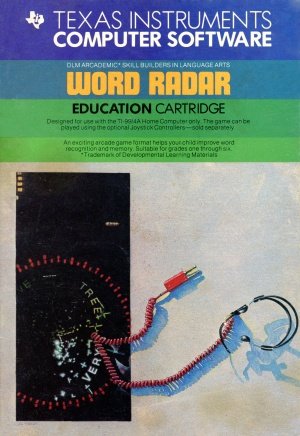Difference between revisions of "Word Radar"
Amycjgrace (talk | contribs) (→Introducing the ARCADEMICTM SKILL BUILDERS IN LANGUAGE ARTS Series) |
Amycjgrace (talk | contribs) (→Introducing the ARCADEMICTM SKILL BUILDERS IN LANGUAGE ARTS Series) |
||
| Line 44: | Line 44: | ||
:: Arcade games are fun and exciting, and no one has to encourage a child to play. When applied to learning, the arcade game format motivates children to persist and to remain involved in the subject. | :: Arcade games are fun and exciting, and no one has to encourage a child to play. When applied to learning, the arcade game format motivates children to persist and to remain involved in the subject. | ||
| − | + | * Success in Learning | |
:: Arcade games start players at a level above their skill, producing high rates of error. Players do not view the errors as failure, but as a challenge to improve. The ARCADEMIC approach also encourages improvement by providing a game with preset options. This preset version is played at a rapid speed and at an advanced level of difficulty. | :: Arcade games start players at a level above their skill, producing high rates of error. Players do not view the errors as failure, but as a challenge to improve. The ARCADEMIC approach also encourages improvement by providing a game with preset options. This preset version is played at a rapid speed and at an advanced level of difficulty. | ||
Revision as of 05:29, 12 February 2022
| Word Radar | |
|---|---|
 Word Rader Manual (Front Cover) [1] | |
| Publisher(s) | Developmental Learning Materials (DLM) |
| Original Retail Price | $39.95 (USD) |
| Programmer(s) | John M. Phillips |
| Part# | PHM 3185 |
| Format(s) | Solid State SoftwareTM Command Module |
| Release | 1983 (4th Quarter) |
| Genre(s) | Educational |
Contents
Gameplay
Advewrtising Blurbs
Front of Manual
Triton Catalog - Fall 1984
Manual
Introducing the ARCADEMICTM SKILL BUILDERS IN LANGUAGE ARTS Series
The ARCADEMICTM SKILL BUILDERS IN LANGUAGE ARTS series was created by Developmental Learning Materials, Jerry Chaffin, Bill Maxwell, and Barbara Thompson. The ARCADE MIC approach uses an arcade game format, colorful graphics, and lively action to create an exciting atmosphere for practicing important learning skills. ARCADEMIC programs provide for the educational needs of individual learners. They allow children to develop skills before progressing to the next level of difficulty. These programs combine learning with fun.
The ARCADEMICTM approach to learning is based on these principles:
- Persistence and Involvement
- Arcade games are fun and exciting, and no one has to encourage a child to play. When applied to learning, the arcade game format motivates children to persist and to remain involved in the subject.
- Success in Learning
- Arcade games start players at a level above their skill, producing high rates of error. Players do not view the errors as failure, but as a challenge to improve. The ARCADEMIC approach also encourages improvement by providing a game with preset options. This preset version is played at a rapid speed and at an advanced level of difficulty.
